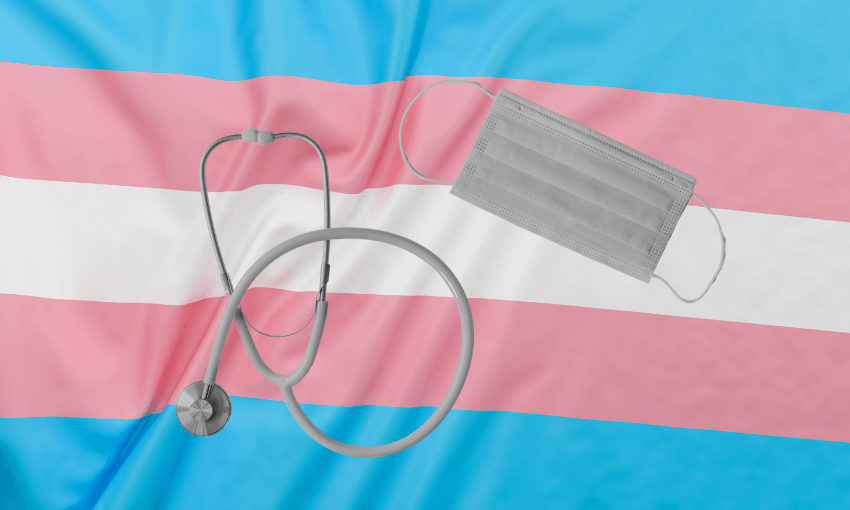Public consultation is currently open on further restricting trans healthcare. Jennifer Shields argues why the process has been flawed from the beginning.
At the end of last month, after many delays and all of a sudden, the Ministry of Health finally released its evidence brief and position statement into the use of puberty blockers.
The brief and statement were pretty much what we’ve come to expect – that there is limited quality evidence for both the risks and benefits of puberty blockers for trans children. None of the Ministry’s documents clarified that this is not unique to trans health, as professor Simon Denny, director of the Mater Youth Health Centre in Brisbane says:
“It’s important to recognise that in many medical fields, high-quality evidence is often limited. A review of Cochrane systematic reviews across various medical disciplines found that only about 13.5% reported high-quality evidence for primary outcomes, with the majority relying on moderate, low, or very low-quality evidence. This pattern is observed in areas such as anesthesia, breast cancer, cystic fibrosis, and multiple sclerosis. Therefore, while acknowledging the current limitations in evidence regarding puberty blockers, it’s consistent with broader medical practice to proceed with treatments based on the best available evidence, especially when guided by experienced professionals and established guidelines.”
Like with other international reviews into transgender healthcare, the ministry’s evidence brief has some concerning methodological flaws, including the classic fatal flaw of failing to consider the primary outcome of puberty blockers: whether they prevent further changes to a young person’s body.
Gender Minorities Aotearoa have some excellent analysis on these flaws: “[The evidence brief] also said that evidence about gender dysphoria being reduced by puberty blockers was bad evidence if the researchers didn’t also check if psychological support, family support and school support could fix ‘gender dysphoria’.
“These have never been considered treatments for gender dysphoria, except in conversion practices, which have been proven to not work, and to cause harm. Family support, psychological support, and support at school are human rights that everyone should have by default. They are not targeted health interventions that can resolve a transgender person’s gender incongruence.”
The Ministry of Health brief was delayed a number of times to take the findings of the Cass Review in the UK into account, even publishing a separate addendum to the brief that specifically examines the results of the Cass Review and subsequent restrictions on care in the UK.
What isn’t mentioned are the critiques of the Cass Review. No reference to the excellent Yale report on its methodological flaws, nor any to the British Medical Association, representing all doctors in the UK, calling for an immediate pause to the implementation of the review’s findings.
What also goes without mention, despite being infinitely more applicable and relevant to a New Zealand context, is the publication of the review into Queensland’s gender services, which found they delivered safe and evidence-based care.
How did this happen?
Could it be that the Expert Advisory Group set up to oversee this work – and now provision of gender-affirming care more broadly – has no transgender people on it? They ended up excluding trans lived experience because, rather ironically, they could not make that group safe for transgender people. This should have been an immediate red flag, a sign that they’d got something wrong, and that they needed to immediately reassess.
It could also be that the Expert Advisory Group specifically excluded anyone affiliated with an “advocacy group”, including the Professional Association of Transgender Health Aotearoa, which includes the vast bulk of professional clinical expertise on transgender health in Aotearoa. That’s like a review into cancer care in New Zealand excluding the New Zealand Society for Oncology.
The Ministry of Health and its advisory group systematically excluded the best expertise we have in this country from contributing to this vital work. They systematically excluded transgender lived experience. And what do we have now?
Well, what was new in the Ministry’s publications was a call for public consultation on further restrictions to accessing puberty blockers. It’s highly unusual and inappropriate to engage in public consultation on a medical matter, particularly for a minority group already exposed to increasing levels of hatred and disinformation. To show just how much of a minority this is: in 2023, 113 young people were started on puberty blockers.
This consultation and the consideration of restrictions has come from the government. It was not requested by the ministry, nor from the clinicians most experienced in delivering this care, nor from the trans community. Knowing how vocal anti-trans New Zealanders are, I can’t help but feel the government is attempting to use public consultation as a way to manufacture consent for restricting trans young people’s access to care.
And it sure does seem like they have a predetermined outcome in mind. Initially, the Ministry of Health’s chief medical officer Joe Bourne reassured me that the ministry felt that clinical trials for puberty blockers were inappropriate. The UK has recently restricted trans children’s access to puberty blockers through a randomised clinical trial, in which 50% of participants will receive the care they need, and the other 50% may receive a placebo.
The World Medical Association’s Declaration of Helsinki on ethical principles for medical research is clear that patients participating in research must give their free and informed consent, and not be pressured or coerced in any way into participating in a trial. Needless to say, removing any access to a healthcare intervention outside of a trial means that no one participating is meaningfully able to consent.
Despite these reassurances and the ethical concerns, restricting trans children’s access to puberty blockers to only those in a clinical trial is one of the suggested options in the online consultation form. When I asked the Bourne about this, I was told they were asked to include it.
It is minister Reti who set the timeline for this consultation – opening late in November, running over the summer break, and closing January 20. The ministry initially organised a 30-minute consultation meeting with 25 members of rainbow community organisations. This is not adequate or meaningful consultation, and it certainly isn’t with those most affected by these decisions – trans children themselves.
Because how could you possibly safely ask children how they feel about their right to access healthcare being restricted? Certainly, you can’t do that in a two-month period, half of which is considered a write-off by most agencies and organisations. The ministry must take the time to get this right, and the minister must let them extend the consultation timeframe to allow this.
After the consultation period closes, the ministry will give advice to ministers Reti and Doocey. These ministers will then work with the ministry to send a paper to Cabinet, who will make the final decision. It will not need to go through Select Committee, and our communities and the experts will not have any further input into the decision.
How many decisions on healthcare has Cabinet made this year that totally contravene the evidence the Ministry of Health provided? There is no reason to believe they will follow the evidence here.
We now have clear evidence that restrictions on gender-affirming healthcare have disastrous effects on the mental health of our young people. A recent study from the US shows a 72% year-on-year increase in suicide attempts amongst trans young people after the introduction of anti-transgender legislation. A heartbreaking paper from the UK asked parents of trans children about their experiences under the puberty blocker ban, and increased anxiety, distress, and poor mental health is near-universal. Trans people in Aotearoa already experience psychological distress at nine times the rate of the general population.
This is a discriminatory act, plain and simple. When asked why they were undertaking this work specifically for trans children and not cisgender children using blockers for precocious puberty, the chief medical officer told us:
“…precocious puberty is a condition where there is an oversupply of sex hormones at an inappropriately young age, which has a consequence for long term health.”
This is not a meaningfully different use to their use in trans children – who experience an oversupply of sex hormones at an inappropriately young age that causes them distress and has a consequence for their long term health without intervention.
The government is directing the ministry to implement restrictions on one population’s right to access healthcare without good cause. They are rushing this process, hoping we don’t notice over the summer break. They have specifically excluded the best expertise available to them. And they will make whatever decision they choose to make with no oversight and apparently no requirement to be guided by evidence.
This process is discriminatory, already doing harm, and has the potential to do massive and irreversible damage to a generation of trans children.
Trans kids did not come into existence through access to healthcare, and removing their access to healthcare will not make them disappear. Especially not this generation, which has grown up with unprecedented levels of visibility and acceptance. It hasn’t been perfect (or at times, good), but this generation has had a glimpse of what a truly trans-inclusive society could be like, and they will not let it go.
It was only 10 years ago that Aotearoa included a “real life experience” requirement to access gender affirming care – a year of living as your gender with no medical support. Many people stayed in the closet, and many more accessed hormones outside of the medical system. So much has changed in just 10 years – we will not let that progress go lightly.
Jennifer Shields is the president of the Professional Association for Transgender Health Aotearoa.





